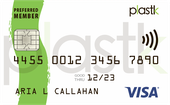A secured credit card is a type of credit card that's backed by a deposit you make with the card issuer which acts as collateral for the card account. This deposit provides the issuer with security if you miss your payments. Typically, secured credit cards are for people who have limited credit history or are subprime borrowers.
The primary advantage to using secured credit cards in Canada is that it can increase your credit score. Of course, to improve a credit score payments need to be made on time each month.
Interest rates and repayments
Interest rates on secured credit cards are typically higher than those on "normal" unsecured credit cards. These higher interest rates are just one of the reasons it's so important that you pay off your balance in full each month. Sticking to a repayment schedule that works for you is essential in building your credit and transitioning over to an unsecured credit card.
Annual fees and other fees
There can be an annual fee on your card, typically around $50, although some cards are more expensive. You can try to avoid this by looking for a secured card with no annual fee. In some cases you may also have to pay a one-off set-up fee, such as 3% of your credit limit.
Credit history and score
With secured credit cards your credit score isn't as much of an issue as it is with unsecured credit cards, because the lender will rely on the amount of money you put down as a deposit as a guarantee of repayment, rather than just relying on your credit score as an indication.
Secured cards and credit repair or establishment
If your credit score has been damaged because of missed payments or insolvency, putting down a security deposit for a secured card is a great way to get back on track. It's also a good route for establishing credit history for a new migrant. While the annual fee and deposit can be expensive depending on your financial situation, if you set a realistic budget this type of credit card is a solution to repairing or establishing your credit.
You'll need a card for online payments
Since you need to have cash on hand to make the deposit required to secure your card, and if you're not particularly worried about your credit score, you may be asking why you shouldn't just use the cash for your expenses and forget about a credit card. But you can't use cash for online shopping and bill payments. You're going to need a card for that, and a secured credit card can have benefits that a debit card or prepaid card won't deliver.
Alternatives to a secured credit card
If you just don't want to use a credit card or that option isn't available for you, there are alternative methods of payment you can use. Each of these options can be used in stores and online, and they are great for people who don't want a credit card.
- Debit card. A debit card is the most popular alternative to a credit card because nearly anyone who has a bank account is given a debit card linked to the account. With debit cards you don't need to worry about your credit score, credit limit, a security deposit, or your credit history. The primary difference between a credit card and a debit card is that when you use a debit card you're using money you already have in your bank account instead of using a credit balance you were approved for based on your credit score.
- Prepaid card. Prepaid cards are a good option if you want to limit how much money the card can access from your bank account. You just load the card with a balance and can use the card until the amount is spent. You may be able to then top up the card with further cash. These don't require any sort of security deposit and typically don't have any sort of fee attached to them.
- Secured personal loan. Borrowing a fixed sum in the form of a personal loan is a good alternative for major purchases, such a car or home renovations. But if your financial history means that you would not qualify for an unsecured credit card, you probably won't qualify for an unsecured personal loan. You'll have to offer some form of collateral to secure your loan, such as a car or other property.


